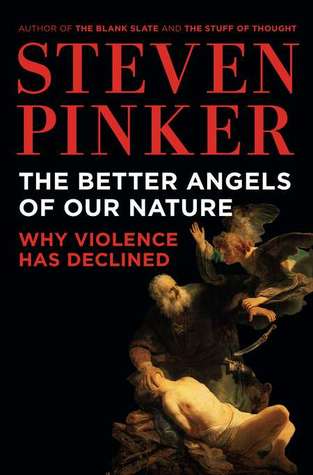The Informational Stakes of Dominance
The commodity that is immediately at stake in contests of dominance is information, and that feature differentiates dominance from predation in several ways. One is that while contests of dominance can escalate into lethal clashes, especially when the contestants are closely matched and intoxicated with positive illusions, most of the time (in humans and animals alike) they are settled with displays. The antagonists flaunt their strength, brandish their weapons, and play games of brinkmanship; the contest ends when one side backs down.100 With predation, in contrast, the only point is to obtain an object of desire.
Another implication of the informational stakes in contests of dominance is that the violence is interwoven with exchanges of data. Reputation is a social construction that is built on what logicians call common knowledge. To avert a fight, a pair of rivals must not only know who is stronger, but each must know that the other knows, and must know that the other knows that he knows, and so on.101 Common knowledge may be undermined by a contrary opinion, and so contests of dominance are fought in arenas of public information. They may be sparked by an insult, particularly in cultures of honor, and in those that sanction formal dueling. The insult is treated like a physical injury or theft, and it sets off an urge for violent revenge (which can make the psychology of dominance blend into the psychology of revenge, discussed in the next section). Studies of American street violence have found that the young men who endorse a code of honor are the ones most likely to commit an act of serious violence in the following year.102 They also have found that the presence of an audience doubles the likelihood that an argument between two men will escalate to violence.
When dominance is reckoned within a closed group, it is a zero-sum game: if someone’s rank goes up, another’s has to go down. Dominance tends to erupt in violence within small groups like gangs and isolated workplaces, where a person’s rank within the clique determines the entirety of his social worth. If people belong to many groups and can switch in and out of them, they are more likely to find one in which they are esteemed, and an insult or slight is less consequential.
Since the only commodity at stake in contests of dominance is information, once the point has been made about who’s the boss, the violence can come to an end without setting off rounds of vendetta. The primatologist Frans de Waal discovered that in most primate species, after two animals have fought, they will reconcile.105 They may touch hands, kiss, embrace, and in the case of bonobos, have sex. This makes one wonder why they bother to fight in the first place if they were just going to make up afterward, and why they make up afterward if they had reason to fight. The reason is that reconciliation occurs only among primates whose long-term interests are bound together. The ties that bind may be genetic relatedness, collective defense against predators, being in cahoots against a third party, or, in an experiment, getting fed only if they work together.106 The overlap of interests is not perfect, so they still have reason to fight for dominance or retaliation within the group, but it is not zero, so they cannot afford to smack each other around indefinitely, let alone kill each other. Among primates whose interests are not bound up in any of these ways, adversaries are unforgiving, and violence is likelier to escalate. Chimpanzees, for example, reconcile after a fight within their community, but they never reconcile after a battle or raid with members of a different community.107 As we shall see in the next chapter, reconciliation among humans is also governed by the perception of common interests.
Notes:
Folksonomies: information reputation dominance
Taxonomies:
/society/unrest and war (0.359727)
/law, govt and politics/government (0.213976)
/technology and computing/hardware/computer networking/router (0.211895)
Keywords:
dominance (0.910638 (negative:-0.546572)), differentiates dominance (0.710883 (neutral:0.000000)), Dominance The commodity (0.700361 (neutral:0.000000)), dominance blend (0.636877 (neutral:0.000000)), informational stakes (0.632947 (negative:-0.543544)), American street violence (0.620272 (negative:-0.549197)), common knowledge (0.586893 (negative:-0.550557)), lethal clashes (0.436888 (negative:-0.493833)), contests (0.419554 (negative:-0.550125)), positive illusions (0.418450 (positive:0.276273)), zero-sum game (0.405546 (negative:-0.469228)), violent revenge (0.400431 (negative:-0.615430)), contrary opinion (0.400189 (negative:-0.550557)), formal dueling (0.399160 (neutral:0.000000)), social construction (0.398648 (neutral:0.000000)), primatologist Frans (0.398358 (neutral:0.000000)), physical injury (0.397595 (negative:-0.777113)), public information (0.395886 (negative:-0.612997)), genetic relatedness (0.390671 (neutral:0.000000)), young men (0.389978 (negative:-0.549197)), small groups (0.385422 (negative:-0.645305)), social worth (0.384805 (neutral:0.000000)), closed group (0.383710 (negative:-0.337111)), primate species (0.383616 (neutral:0.000000)), different community.107 (0.381709 (neutral:0.000000)), common interests (0.374540 (neutral:0.000000)), long-term interests (0.373012 (neutral:0.000000)), collective defense (0.372958 (negative:-0.277392)), insult (0.357954 (negative:-0.658519)), predation (0.299557 (negative:-0.367308))
Entities:
Frans de Waal:Facility (0.714907 (neutral:0.000000)), theft:Crime (0.662788 (negative:-0.777113))
Concepts:
Nash equilibrium (0.971560): dbpedia | freebase | yago
Frans de Waal (0.942269): dbpedia | freebase | yago
Game theory (0.938024): dbpedia | freebase | opencyc
Primate (0.876704): dbpedia | freebase | opencyc
Bonobo (0.773303): dbpedia | freebase
Epistemology (0.704293): dbpedia | freebase | opencyc
Human (0.619530): dbpedia | freebase | opencyc
Knowledge (0.613150): dbpedia | freebase





